|
|
|
Sort Order |
|
|
|
Items / Page
|
|
|
|
|
|
|
| Srl | Item |
| 1 |
ID:
142180
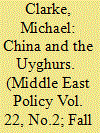

|
|
|
|
|
| Summary/Abstract |
Over a decade ago Dru C. Gladney argued that China faced the prospect of Xinjiang (or East Turkestan as many Uyghurs would prefer it) becoming its own West Bank if it failed to address the problems stemming from its forceful attempts to integrate the region. In a neat summation of Beijing's core dilemma, he suggested, “If China does not explore other options besides repression, restriction and investment, millions of Uyghur Muslims might become disenfranchised, encouraging some to look to the intifada, the Taliban or al-Qaeda for inspiration.” Chinese dissident Wang Lixiong in his 2007 book, My West China: Your East Turkestan, also pointed to the likely “Palestinization” of conflict in Xinjiang in which “the full mobilization of a people and the full extent of its hatred” would be directed against the state.
|
|
|
|
|
|
|
|
|
|
|
|
|
|
|
|
| 2 |
ID:
142173
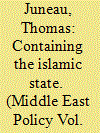

|
|
|
|
|
| Summary/Abstract |
In early 2014, the organization then known as the Islamic State in Iraq and the Levant swept across northwestern Iraq while simultaneously expanding the territory under its control in eastern Syria. The group, which renamed itself the Islamic State (IS) in June 2014, is led by members of what used to be al-Qaeda in Iraq. It has incorporated Iraqi Sunnis who hold grievances against the Shia-dominated government in Baghdad (mostly former members of Saddam Hussein's regime and alienated tribes) as well as a variety of armed Syrian opposition groups. By mid-2014, IS threatened to further expand in Iraq and Syria, while there were plausible fears that it could cross into neighboring countries, especially Jordan. It has entrenched sectarian divisions and further weakened the state in Iraq and has worsened an already devastating civil war in Syria. It represents a magnet and a safe haven for terrorists in the heart of the Middle East.
|
|
|
|
|
|
|
|
|
|
|
|
|
|
|
|
| 3 |
ID:
142179
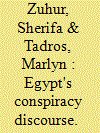

|
|
|
|
|
| Summary/Abstract |
Edward Said's concept of orientalism was developed from his perception of the role of scholarship in the West's exploitation of the East for the purpose of conquest and the maintenance of political power. It was not simply a construct of Eastern inferiority versus Western superiority. Hassan Hanafi, chair of philosophy at Cairo University, first encouraged a “science of occidentalism” to counter orientalist studies.1 However, as Syrian philosopher Sadiq al-Azm has suggested, one must heed Said's warning to the subjects and victims of orientalism against the dangers of applying the readily available structures, styles and ontological biases of orientalism upon themselves and others.2 That would result in orientalism in reverse, or the internalizing of orientalist political intentions.
|
|
|
|
|
|
|
|
|
|
|
|
|
|
|
|
| 4 |
ID:
142175
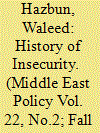

|
|
|
|
|
| Summary/Abstract |
In recent decades, scholars of the Middle East have come to understand that the long-dominant neorealist approaches, with their focus on the relative material power of states, fail to explain the dynamics of security politics in the region. As Gregory Gause explains, Arab states “have overwhelmingly identified ideological and political threats…to the domestic stability of their ruling regimes as more salient than threats based upon aggregate power, geographic proximity and offensive capabilities.” While Gause refers to threats “emanating from abroad,” others have highlighted that the primary function of security policy in Arab states is to secure the interests and power of the ruling regimes from ideological and political threats that emanate from within the territory of the state.
|
|
|
|
|
|
|
|
|
|
|
|
|
|
|
|
| 5 |
ID:
142174
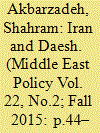

|
|
|
|
|
| Summary/Abstract |
President Hassan Rouhani came to office in 2014 with a popular mandate to relieve Iran's international isolation. His electoral campaign focused on ending the crippling sanctions Iran has suffered due to the ongoing dispute over its nuclear program. Rouhani promised to make “moderation” the centerpiece of his government, but breaking out of isolation has proven to be much more difficult than the reform-inclined Rouhani government expected. The Arab upheaval has morphed into sectarian warfare, championed by the Islamic State of Iraq and Syria (“Daesh” in Arabic and Persian). This conflict has presented Iran with a most unwanted problem. From its inception, Iran has projected itself as a champion of the whole Muslim community. It has stayed clear of sectarian disputes with its Sunni neighbors and presented its disagreements with Saudi Arabia, for example, in terms of global Muslim interests. It highlighted the failure of U.S.-friendly Arab leaders to protect the Palestinians as the cardinal charge against them. Their Sunni affiliation was not the issue. However, the bloody sectarian conflict in Iraq and Syria, with spot fires in other states, has forced Iran to engage with the sectarian issue. Events of the past few years have made it impossible for Iran to ignore the schism. This complicates President Rouhani's task: his promised mantra of “prudence and hope” (tadbir va omid) has effectively been sidelined in the context of forming a Daesh policy. Iran is forced into relying on its Shia allies to respond to the threat posed by Daesh, making Iran a reluctant Shia power in the region.
|
|
|
|
|
|
|
|
|
|
|
|
|
|
|
|
| 6 |
ID:
142171


|
|
|
|
|
| Summary/Abstract |
Since I'm kicking things off, I thought I'd set the context for the nuclear deal itself, the Joint Comprehensive Plan of Action, or JCPOA. I'll then offer my views about implications for the region as well.
|
|
|
|
|
|
|
|
|
|
|
|
|
|
|
|
| 7 |
ID:
142178
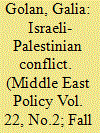

|
|
|
|
|
| Summary/Abstract |
The Arab-Israeli conflict has defied numerous attempts at resolution, placing it in the category of intractable conflict. Yet even a conflict as intractable as this can be transformed, and breakthroughs toward peace can occur. Indeed, this has happened between Israel and Egypt, Jordan, and even the Palestinians — in the form of the Oslo Accords. Looking at the Israeli side of the conflict, numerous factors lay behind these breakthroughs, while their absence or the addition of other circumstances or factors accounted for the numerous failures.1 An understanding of some of these factors may provide insight not only into the pitfalls that await future efforts at resolution, but also into possible remedies.
|
|
|
|
|
|
|
|
|
|
|
|
|
|
|
|
| 8 |
ID:
142172


|
|
|
|
|
| Summary/Abstract |
The Middle East has never failed to amaze observers who follow it closely. In the last several months, news about the Iranian-Saudi cold war, the rift between U.S. President Barack Obama and Israeli Prime Minister Benjamin Netanyahu, and Washington's support to Egyptian President Abdel Fattah Al-Sisi has dominated the headlines. At the Nuclear Non-Proliferation Treaty (NPT) Review Conference in New York, April 27-May 22, these parties all took significantly different positions.
|
|
|
|
|
|
|
|
|
|
|
|
|
|
|
|
| 9 |
ID:
142176


|
|
|
|
|
| Summary/Abstract |
The rise of the Islamic State in Syria and Iraq (ISIS, ISIL or IS) has once again brought the Middle East to the center of the international stage. This quasi-state's recent territorial gains, together with its harsh treatment of religious minorities, brazen media campaign and destruction of the region's unique cultural heritage, have all galvanized millions in the region and across the world against the group. The unprecedented number of youth from countries across the Muslim world as well as from Western diasporic communities volunteering to join ISIS has generated enormous security concerns for the governments of jihadists’ home countries. It is believed that the subsequent reemergence of a large and increasingly dedicated, experienced and unified transnational jihadist force poses a challenge not only to regional security in jihadists’ home countries, but also to key Western nations engaged in combatting the Islamic State and similar groups around the world.
|
|
|
|
|
|
|
|
|
|
|
|
|
|
|
|
| 10 |
ID:
142181


|
|
|
|
|
| Summary/Abstract |
A large proportion of economic growth is accounted for by knowledge-driven technological change and innovation. Irrespective of whether innovation is related to products or processes, whether it is abrupt or incremental in nature, or whether it is technological or related to business models and organizational structures, it improves value for the consumer, the producer or the society at large. It is a nonlinear process involving complex interactions among a multitude of organizations.
|
|
|
|
|
|
|
|
|
|
|
|
|
|
|
|
| 11 |
ID:
142177


|
|
|
|
|
| Summary/Abstract |
Is terrorism — commonly understood to mean deliberate attacks on innocent civilians — ever justifiable, or at least subject to morally persuasive distinctions? I will argue that while terrorism is always morally wrong, it is both possible and desirable to distinguish between degrees of moral wrongness. I will examine this issue in the context of just-war moral theory and the Israeli-Palestinian conflict.
|
|
|
|
|
|
|
|
|
|
|
|
|
|
|
|
|
|
|
|
|